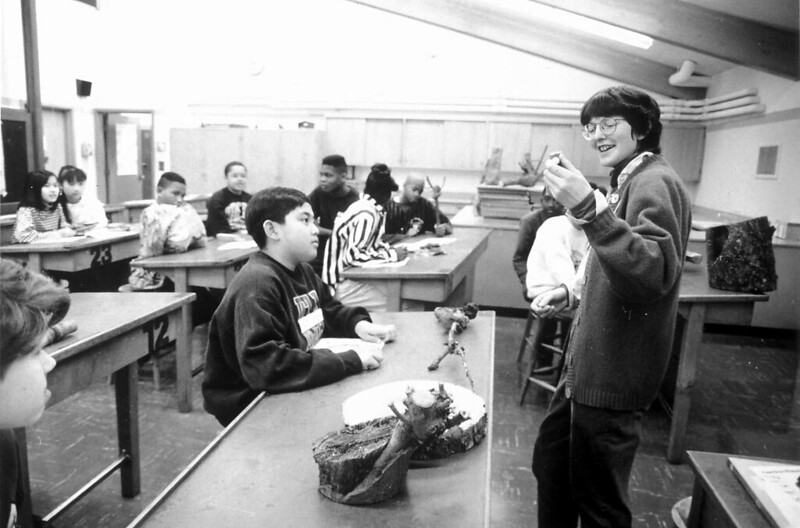
I grew up in Eastern Washington State. The town was so small that the high school had 64 students and my class had 14 students. The teachers had to teach multiple subjects but they did a great job. One teacher especially has shaped me. Dorothy Smith.
Dorothy taught English, history, and German. Mostly she challenged us to think.
In the fall and spring Dorothy would ask me to do some work for her, changing storm windows for screens and such. After I was done, she invited me to come to her library. She asked me questions and in doing so taught me to think critically. She never mentioned Socrates, but she embodied his teaching method. One day she encouraged me to read John Locke, Thomas Hobbs, and Jean-Jacques Rousseau. I didn’t understand it all, but it was interesting.
One spring she asked me what I had learned reading them. “They differ from one another, but they all agree on the idea of a social contract.”
A social contract is an agreement within a community of people about how they will govern themselves and the rights and duties of members and the rights and duties of those who, at the moment, govern. Social contracts set out the processes and patterns of how laws and policies are made and changed and how leaders are selected.
This idea was in response to the monarchies of Western Europe, but it was not new. The Ancient Greeks understood social contract. The Iroquois Confederacy, like many agreements between tribes on this continent, had a well developed social contract that encouraged participatory democracy.
A social contract can only exist if the majority of the community are committed to it, strengthen it, abide by it, and work for its betterment.
The social contract in the United States is not perfect. From the beginning this nation denied that certain groups of human beings could be included in this contract. We still have a long way to go.
As we enter a political season, it is on all of us to strengthen and continue to develop our social contract by including all human beings in it. Some are willing to tear apart our imperfect social contract for fear that excluded groups will be fully included. These are people who assume that their well-being is based on having a higher status than others.
But the whole idea of a social contract is that our well-being is enhanced when the needs and rights of all are all honored. We are all a part of each other. We are better together.
What concerns me most is not the folks who wish to tear apart our social contract. What concerns me most are those who in seeing them at work remain on the sidelines.
Ways to support our social contract:
- Educate Ourselves: Understand the history, laws, and workings of the U.S. government, and be aware of the current events that shape public policy.
- Vote Responsibly: Research candidates and issues before voting. Encourage others to vote and perhaps participate in or support voter registration drives.
- Engage in Civic Activities: Attend town hall meetings, participate in community planning, and engage in other civic activities.
- Promote Tolerance and Understanding: Encourage dialogue, respect differences, and try to understand the perspectives of others, especially when they differ from your own.
- Promote Sustainable Practices: Support policies and practices that protect the environment and ensure the well-being of future generations.
- Support Economic Opportunities: Advocate for policies that promote job creation, affordable housing, and equal opportunity for all.
- Volunteer: Engage in community service or support nonprofits that help those in need.
- Support a Free and Responsible Media: Consume news from reliable sources, support journalism, and think critically about the information you receive.
- Engage with Representatives: Contact your elected officials about issues that matter to you and hold them accountable.
- Encourage Transparency: Support policies and practices that ensure transparency in government and business.
- Promote Education: Advocate for a robust and inclusive education system that prepares all citizens to participate in society effectively.
- Support the Arts and Culture: Engage with and support local arts and cultural events and institutions. They play a pivotal role in building a cohesive society.
- Respect Individual Rights: Uphold and protect the rights of others, even if you disagree with their beliefs or lifestyles.
- Engage in Respectful Discourse: Foster environments where open and respectful discussions can take place. Avoid name-calling and strive for understanding.
- Commit to Lifelong Learning: Continue to educate yourself on various topics and issues, and encourage others to do the same.
In honor of Dorothy, I want to offer another: Asking good questions and nurturing our young people to grow and develop. I understand now that Dorothy didn’t just invite me over to change out her screens for storm windows. She invited me to invest in me.
It is time to reinvest in one another that we might form a more perfect union, not just of states, but of people.
Photo: Item 130338, Fleets and Facilities Department Imagebank Collection (Record Series 0207-01), Seattle Municipal Archives.
